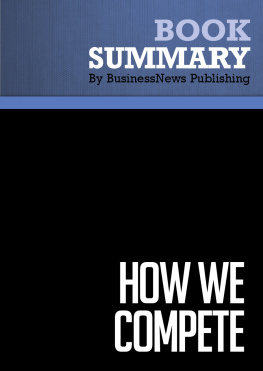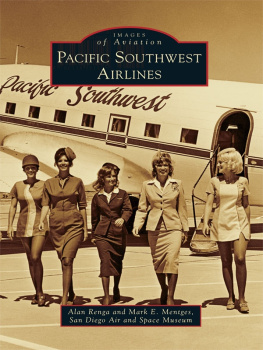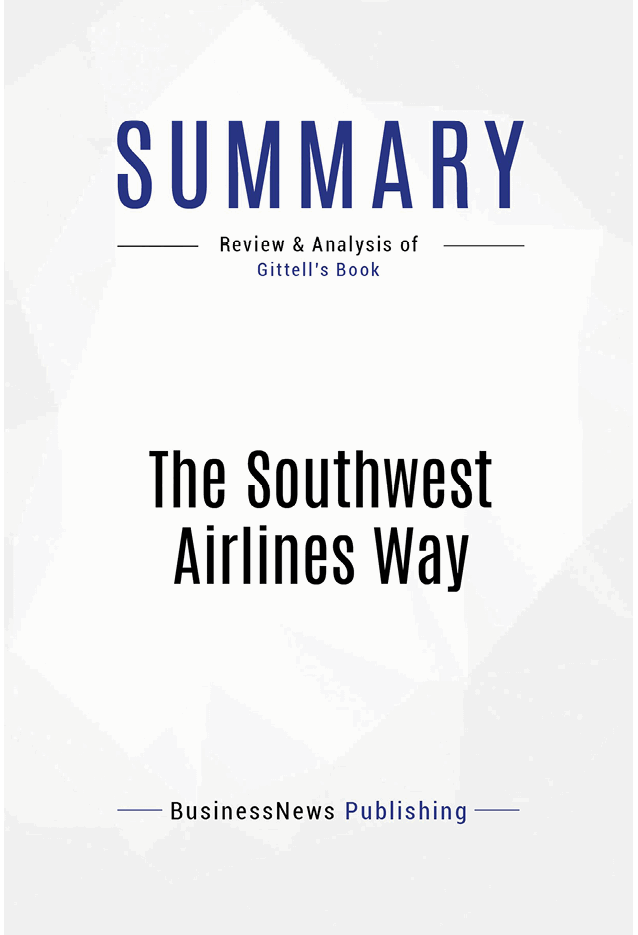Book Presentation: The Southwest Airlines Way by Jody Gittell
Book Abstract
Main Idea
By any measure, Southwest Airlines has been the standout success story of the U.S. airline industry. Among its accomplishments:
- In a highly volatile industry, Southwest has been profitable every year except for the year in which it was established. That means by 2003, Southwest has been profitable for 31 years.
- For most of 2002, Southwests $9 billion market capitalization has exceeded the combined market capitalization of every other U.S. airline.
- Southwest rates consistently high in Fortune Magazines 100 Best Companies to Work For in America and from 1992 to 1996 also won the airline industrys Triple Crown the fewest delays, complaints and mishandled bags.
Clearly, Southwest is doing something right. Most attempts to copy Southwest have focused solely on operational issues:
- Flying just one aircraft type to cut down on training and maintenance costs.
- Using smaller, less congested airports to avoid schedule disruptions caused by multiple aircraft demands.
- Eliminating meal service and seating assignments to allow aircraft to be turned around more rapidly.
Despite following these same strategies, however, no other airline has yet been able to successfully clone Southwests success. Whats missing is the secret sauce Southwest uses to make all these operational factors come together effectively and efficiently. Lying at the heart of the Southwest success story are three elements:
- 10 organizational practices which build relationships between managers and frontline employees and among employees.
- An environment which emphasizes shared goals, shared knowledge and mutual respect.
- Sound communication techniques which are frequent, timely and focused on solving problems.

Note especially the fact all ten of these organizational relationships are highly complementary. They only generate benefits when all ten are present and well implemented. They work in unison rather than in isolation. It is not until all ten are present that substantial benefits can be realized. This, in turn, generates both good news and bad news. The good news is any company which follows the lead of Southwest and builds strong organizational relationships can achieve great success. The bad news is this isnt easy it will require making changes on multiple fronts simultaneously to achieve it. The results, however, as in the case of Southwest Airlines, can be impressive and long-lasting.
Far from being a pie-in-the-sky, soft approach to management, attention to relationships is simply good management practice. The Southwest Airlines Way involves more than pursuing a particular product marketing strategy. For Southwests leaders, taking care of business literally means taking care of relationships. They see these relationships with their employees, among their employees, and with outside parties as the foundation of competitive advantage, through good times and bad. They see the quality of these relationships not as a success factor, but as the most essential success factor. They believe that to develop the company, they must continually invest in these relationships.
Jody Gittell
About the Author
JODY GITTELL is an assistant professor at Brandeis University. Dr. Gittell is also a faculty member of the MIT Global Airline Industry Program. Her area of specialization is in human resources and service operations management. Dr. Gittell is a frequent speaker at airline industry conferences.
Important Note About This Ebook
This is a summary and not a critique or a review of the book. It does not offer judgment or opinion on the content of the book. This summary may not be organized chapter-wise but is an overview of the main ideas, viewpoints and arguments from the book as a whole. This means that the organization of this summary is not a representation of the book.
Summary of The Southwest Airlines Way (Jody Gittell)
1. 10 Organizational Relationships
Southwest Airlines has used these ten relationships to generate extraordinary performance. Each of these practices reinforce the others so the total effect of all these relationships combined is greater than the sum of each individual part. Any organization can improve the quality and efficiency of its performance by adapting these relationships to its own specific requirements.
1. Outstanding business leadership
While its true every organization would like to have a charismatic leader, that isnt necessarily a prerequisite to success. Good and effective business leaders must have:
- Credibility the ability to inspire trust in their workers.
- Empathy caring deeply for the well-being of the employees.
A business leader will develop credibility over time rather than all at once. Once there is a long history of telling it straight and being up-front with employees, then they will start believing you will do the same in the future. Credibility is built up one episode at a time over an extended period, but it can be dissipated in an instant if bad judgement is exercised in an attempt to deceive the employees. Southwests high profile former CEO, Herb Kelleher, exemplified credibility with the Southwest employees because he had a long and unbroken history of always telling things like they were, without sugar coating. As a result, Kelleher had a very high degree of credibility within the organization.
As desirable as credibility is, it is not by itself sufficient. Outstanding business leaders also find ways to demonstrate conclusively they care about the well-being of their people individually. At Southwest, this is demonstrated by the fact the company has a no layoff record which they have maintained even in the face of the dramatic ebbs and flows of the airline industry. It is also well known that Kelleher and COO Colleen Barrett are happy to be approached by Southwest employees who need help in dealing with their personal problems. Not only do they listen but Kelleher and Barrett get hands-on involvement in helping people deal with their problems. They are perfectly happy to cross the boundaries of the organizational chart to find effective ways to help their people out. In this way, they demonstrate they care on an everyday basis rather than just when crises roll around.
I can call Herb today. You dont just call and say theres a problem. Hell say, think about it and tell me the solution you think will work. He has an open door policy. I can call him almost 24 hours a day. If its an emergency, he will call back in 15 minutes. He is one of the inspirations for this company. Hes the guiding light. He listens to everybody. Hes unbelievable when it comes to personal etiquette. If youve got a problem, he cares.
Pilot, Southwest Airlines
Relationship focus as a way of doing business not only can drive growth and profitability, it can sustain them through crises and through ups and downs in the business cycle. It can help organizations adapt to the turbulence of todays business world.








